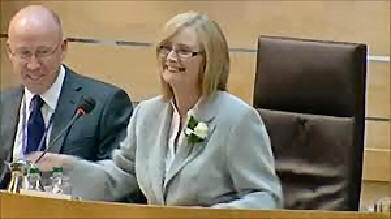|
PARLIAMENTS, wherever they are in the world, be it Australia,
Washington, France or Scotland, must be treated with respect if they are
to command the respect of the nation. The UK Parliament has seen plenty
of disgraceful events and tales of corruption that have undermined its
credibility, leaving an electorate to feel disillusioned with the entire
political system.
There was
the big expenses scandal that revealed Members of the Westminster
Parliament from virtually every party represented to be involved to a
greater or lesser degree in various forms of ‘fiddling the tax payer.’
From ‘flipping’ their homes to get the maximum amount of money towards
their keep, to the famous building of a duck pond at our expense. You
may recall when in 2009, the Tory grandee Sir Peter Viggers claimed
£1,600 from the House of Commons fees office for his floating duck
island at his Hampshire home.
If you need
reminding, here’s the original story:
http://tinyurl.com/qfmmbo. And that was but a small part of his
three claim for gardening of £30,000, including £500 for manure.

Sir
Peter Viggers duck island and duck house at his home.
He claimed £1,600 to have it built.
Of course,
there is more to respecting an elected assembly of any kind that keeping
the finances honest and straight. American citizens have huge respect
for the office of the President that goes well beyond the individual who
may hold that office at any one time.
The immense
overarching task of the Speaker or Presiding Officer includes making
sure that elected representatives behave properly. There are clear rules
and guidance for all of us in areas like using un-parliamentary
language. You can read those rules here:
http://tinyurl.com/oplx5an
There is a separate but similar guide for staff at the Parliament which
you can also find on the Scottish Parliament website:
www.scottish.parliament.uk
Our Presiding Officer (PO) at the Scottish Parliament is
Tricia Marwick MSP for Mid-Fife and Glenrothes. As PO, Tricia has no
party affiliation whatsoever and I think everyone in the Parliament
shows the respect for both her and for the Office that she merits and
deserves. She takes no nonsense from any of us! She will pull up any MSP
from any party, including Cabinet Secretaries or even the First Minister
if she regards their behavior as inappropriate in some way.

Scottish Parliament
Presiding Officer, Tricia Marwick MSP
You might be wondering by now why I am talking about
conduct in the Chamber this week. Here at last is the answer!
As some of you will know already, I am Convener of the
Parliament’s European and External Relations Committee. On Thursday,
Ruth Davidson MSP and leader of the Scottish Conservative Party, decided
to release written evidence to the Committee which the members had not
themselves seen and will not see until next Thursday. During First
Minister’s Question Time, she waved a document which she declared was
the undisclosed evidence from EU expert, Jean Claude Piris, arguing that
France would not agree to Scotland’s entry into the EU without a
Referendum.
Ms Davidson characteristically revealed two things: her
willingness to break Parliamentary protocol and her unwillingness to
accept that in fact Scotland already is a member of the EU, though she
might wish it were otherwise.
This kind of behavior is unacceptable. I have no idea
what the outcome was but I rather suspect that Ms Davidson will have
paid a visit to the Presiding Officer.
I will be conducting my own inquiry into how it happened.
The European Question
To any normal person living outside of the intricate
academic theses over Scotland’s EU membership, the whole issue is
impenetrable I know. Most people I speak to about it are inclined to say
either that they don’t understand it or that they just aren’t
interested.
I can appreciate why. Europe’s affection for acronyms
like CAP, CFP, BEREC, ENOSA, EBA, EUSA and the like is off-putting in
itself. You can get an idea here:
http://tinyurl.com/octxfn5
But Europe is our largest trading partner, it is a bloc
of more than 510 million people, it has the power and the legal systems
to keep our rights protected, to give us free trade, freedom to live and
work or be educated in any of the member countries, to have the same
rights as the citizens of those countries have if we elect to reside
there or even holiday there. It provides the legislation that overrules
that of the individual countries on everything from the right never to
be tortured to the commonality of road signs.
On Thursday past, the European and External Relations
Committee set to examining Scotland’s membership of the European Union
under the Scottish Government’s proposals for an independent Scotland.
Two panels of experts took our questions with remarkable
patience, for which I thank them. There were plenty of them, from every
perspective on the debate, so it was a highly productive and informative
meeting.
The one point that they all agreed upon was that Scotland
would not be ‘left out in the cold’ when we vote for independence as The
Herald set out in its report from the meeting:
http://tinyurl.com/om9st4o
It was fascinating to hear the views of all: David
Crawley, a former civil servant and expert on EU affairs who was
previously head of the Scotland’s representative Office in Brussels;
Professor Laura Cram, professor of European politics at the University
of Edinburgh; Dr Paolo Dardanelli, senior lecturer in comparative
politics at the University of Kent and Professor John Bachtler, director
of the European policies research centre at the University of
Strathclyde.
All of the panelists, from their different perspectives,
agreed that EU membership was in the best interests of Scotland. You can
watch the Committee meeting here:
http://tinyurl.com/752erar though I warn you, it lasted for two
hours.
The Government’s position, set out in Scotland’s Future,
is clear enough if you read from page 216 onwards. Here, by the way, is
the link for the full document:
www.scotreferendum.com
In a nutshell, Scotland needs and wants to remain in the
EU. We are already a member as part of the UK but Westminster’s
priorities in Europe aren’t ours and we have not voted for them. A
Conservative government there, if returned to power in 2015, has
committed to hold an in/out referendum on membership in 2017, something
the current Scottish Government is not in favour of.
We want to have more MEPs – we would probably jump from
our current six to 12 or 13 with independence – and a Commissioner. From
that position, and from the lessons we’ve learned from other smaller
European countries like Lithuania, the current holders of the
presidency, Bulgaria, Estonia and Ireland for example, we can push
forward our own priorities far more powerfully.
But the debate around whether we can negotiate our
continuation in the EU after independence, or whether we would have to
somehow submit ourselves as a candidate rather as Turkey is currently or
as Croatia was up until last summer when it joined the family of
nations.
Academics from every corner of Europe have been declaring
their views. Trouble is of course, it’s never happened before. We’ve
never had a situation where one EU member country has become two
independent countries, both continuing as EU members in their own right.
So speculation is rife and academics love debating the
theses to support their differing arguments. Some of these centre on
issues like Article 48 and 49 or on how long membership negotiations
would take. The day after a Yes vote, Scotland won’t have been ejected
from the EU. We will be in exactly the same position as we were on 17
September. It is only after about 18 months, in May 2016, when we have
Independence Day that new arrangements on everything come into place.
It is inconceivable to me that the EU is going to want to
ditch Europe’s most significant supplier of oil and gas, renewable
energy and a serious player on the global stage of research and
development in life sciences and technology.
At the end
of the day, I believe the outcome is really about political will rather
than Article 48 or 49 as Dr Dardanelli explained to the Committee.
The debate
continues. Watch this space. |

